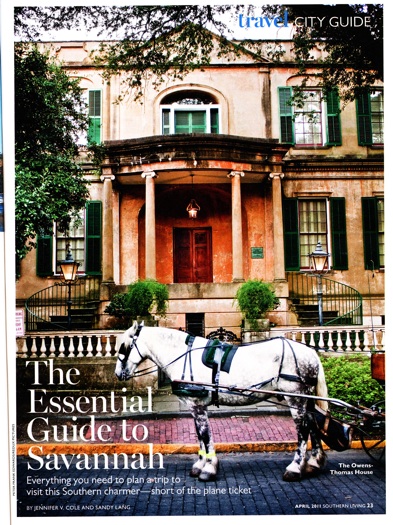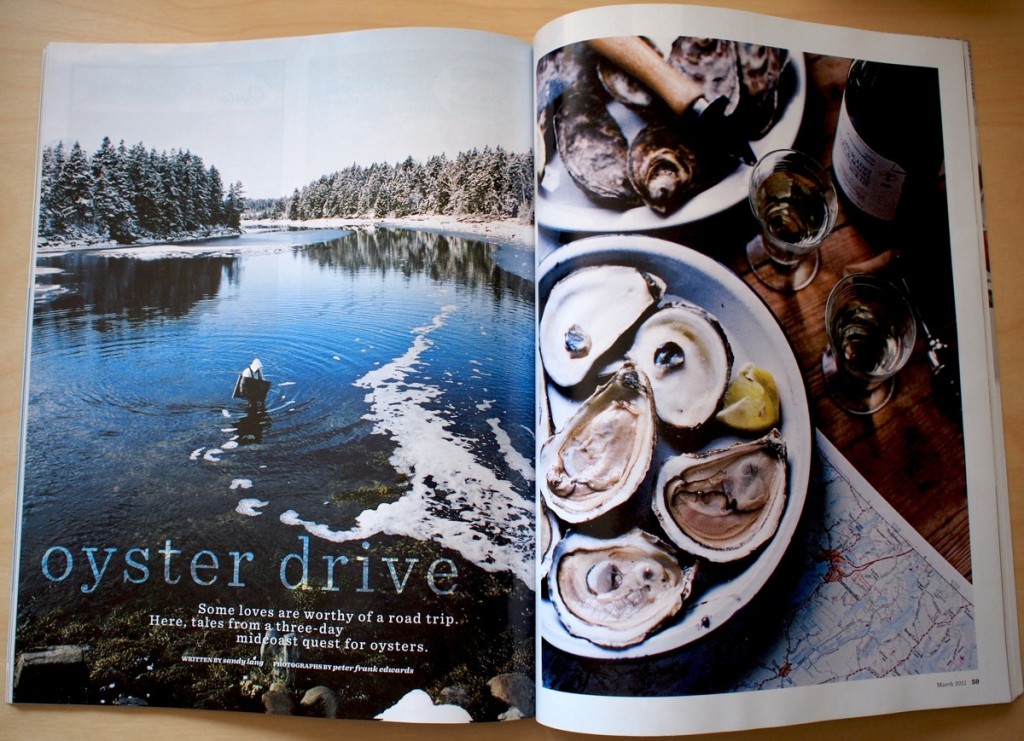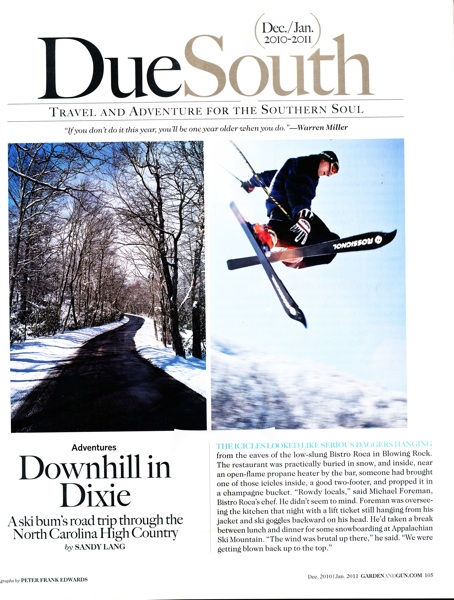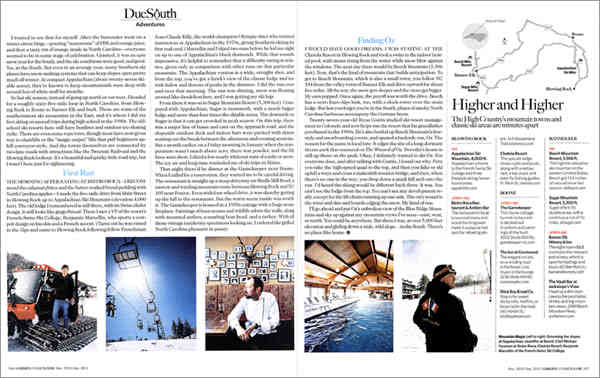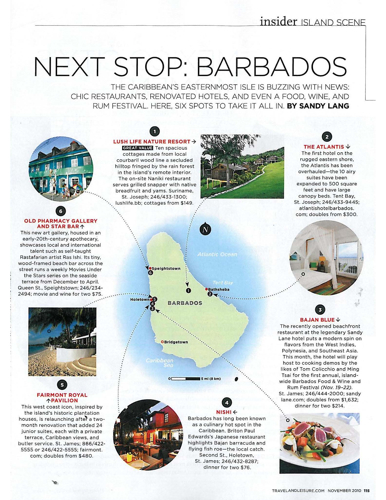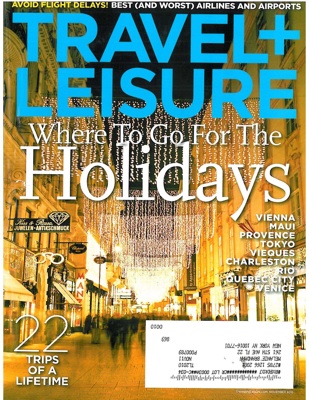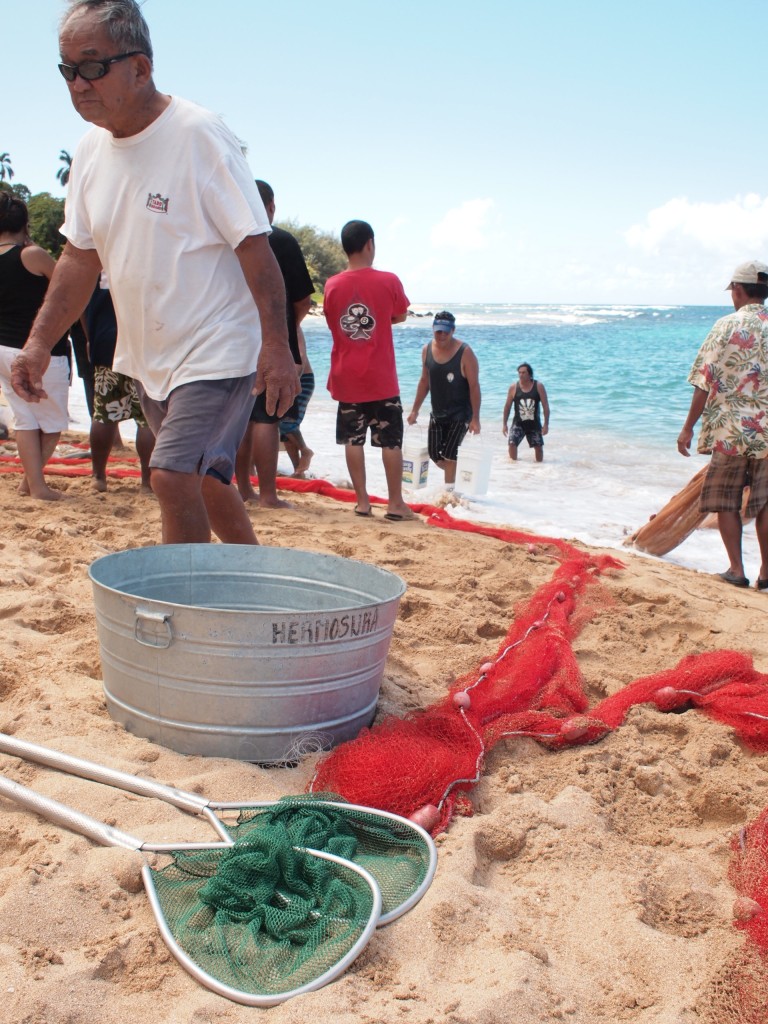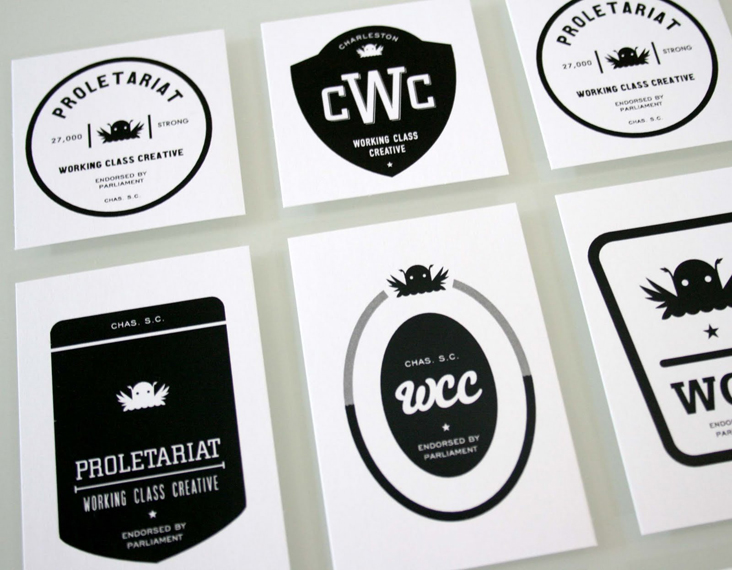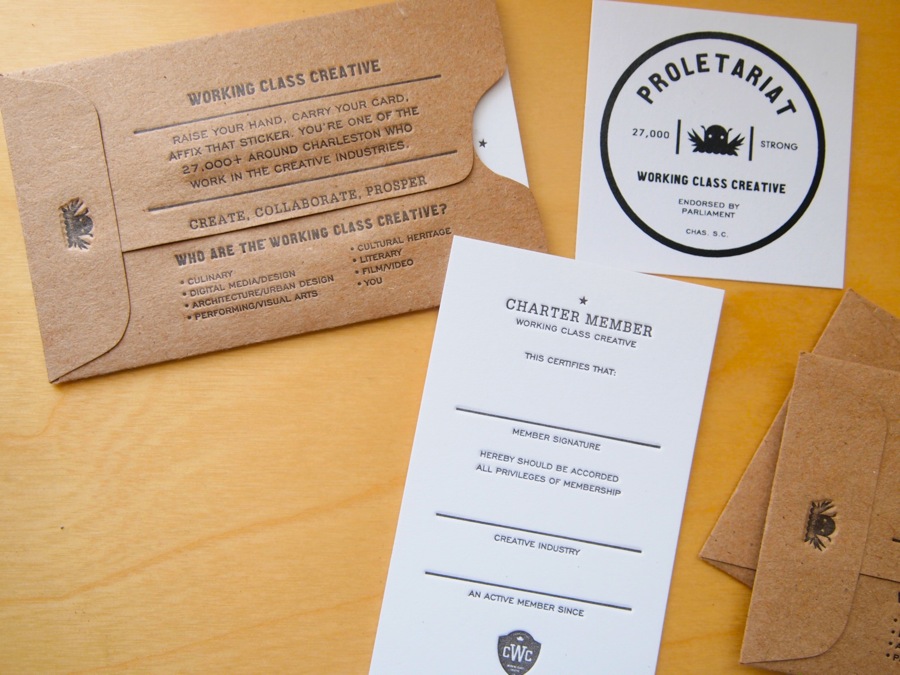Our new feature for Maine, the magazine…
Play a record, and you can almost see the music spin into the rafters and out into the tall birch trees. We stack LPs on an old portable record player we picked up last summer, a GE Wildcat that’s become a compact, low-fi listening solution for the midcoast cabin. Vinyl is a classic, a fit for my state of mind in Maine. Especially on days that stretch out, just begging for music in the long dark of winter or the Longer Days in summer. We can’t get enough of lining up the albums, dropping the needle and letting them play. To add some fresh rhythms, one Friday we decide to head out on a weekend drive for vinyl.
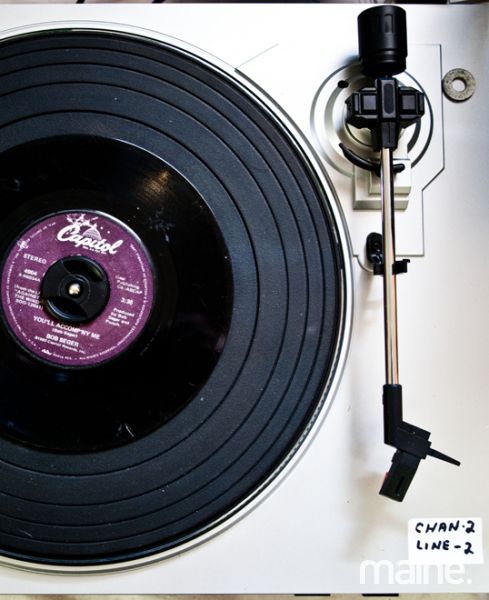
Wait. For the first few hours, we don’t drive at all. We leave the car parked awhile and hoof it through Portland’s unofficial “vinyl district,” along and around the blocks of pizza and art up on Congress Street. There are a handful of vinyl-sellers—a surprising concentration, actually—and I want to stop in at the granddaddy. Enterprise Records is a landmark of the city’s vinyl scene, a destination for purists. Records—and only records—are bought and sold here. There are sections for jazz, blues, dub ska, rockabilly, old–time bluegrass, French pop vocals, and more. The music begins as you walk in the door. This day, writer and recent Portlander Eileen Reynolds has some retro-rhythm reggae going on the turntable near the cash register, the album Dubbing with the Royals. We all start talking and she tells us that the owner has driven somewhere south for the week on a music foray, and that the big spring version of the Portland Record Fair is coming up on May 1. We thumb through the bins of LPs, and she plays another side of dub tracks, then puts a vintage Cajun record on deck for later. The quirky mix of vinyl sounds great. Is there anything better than music? Before long, we put a batch of LPs on the counter to buy and leave with a small armload.
Back outside, the just-over-one-foot-square LPs are a decent windbreak during the gusty two-minute walk to a red door at 578 Congress (near Otto Pizza), then we go up a narrow staircase that leads to Moody Lords on the second floor. Where Enterprise is straightforward and spare, Moody Lords is groovy and freeform, with bins of jazz, funk, rock, and world albums (including new and local vinyl from Time-Lag Records), along with vintage clothes and electronics. I’ve never seen such a collection of music that I know so little about. (Andrew Chang, one of the co-owners, describes the collection as “purposefully eclectic,” with lots of obscure and overseas labels of the sixties and seventies.) With braids in her hair and snow boots on her feet, Madeline Leach, another co-owner, is playing an old, crackling Roland Kirk jazz album on a Numark turntable. When I ask about the store’s name, she smiles. Leach and the other business founders—all in their twenties—have been friends for a while, and they like to make up slang. She says they call the non-pop records they like “moodys,” and people who are good at something “lords.” A music and clothing store with a hazy, band-sounding name? That works.
Stop Making Sense
I’d heard there was a good vinyl vendor at the Pride’s Corner Flea Market in Westbrook, a huge indoor space that fills up on weekends with Mainers looking for something else to collect. Early the next day, we find him easily. Mike Breton’s booth is halfway back and to the right, between the baseball card guy and model car guy. He’s the one with a necklace strung with vintage airplane charms and a full head of dark purple hair. The eggplant color is left over from a Halloween glam-rock costume, he says. His wife and daughter like the shade, and it’s probably good for business. We start checking out the records. There’s Iggy Pop, Joan Baez, the Brady Bunch, metal bands, folk, jazz, blues. He’s organized. There are even separate sections for 1980s alternative and 1980s pop.
Near the used turntables he’s selling, we talk about the differences between vinyl, CDs, and MP3s. “There’s a warm fatness to the sound of records,” he muses, and you want to look at the album cover art and read the liner notes. Then there’s the tactile ritual of taking a record out of its sleeve, putting it on the turntable, and placing the needle on the record. I’m nodding. I know what he means. Pretty soon, he’s putting a Talking Heads record on his personal turntable on the floor. Behind Breton, two twenty-somethings ask about the retro video-game cartridges he also sells. I hear the words “Atari” and “Nintendo” and turn to get back to our vinyl task. In short order, we mine the booth’s bins for Thompson Twins, General Public, and Roxy Music, and while making our purchase, Breton suggests we also check out Mike’s Music down in Sanford. We’ve heard about this other Mike before, and add him to the list.
But first we get back on the road and head north on I-95 to the exit for the Kennebec River town of Waterville, where you know you’ve arrived at the Record Connection when you see a giant spinning-record mural wrapped around the bricks of a blue-painted wall. Inside, owner Bob Richard has more than 10,000 albums ready to flip through—from Perry Como to hip-hop—including those in the $1 room upstairs. The records are arranged neatly in plastic sleeves, and in one of the building’s former apartment rooms there are shelves of used books on art, travel, fiction, and photography—a cool match for the music. Suddenly, a guy in a KISS ball cap walks in the front door and blurts, “You got any good records? Any KISS? Any Michael Jackson?” Nonplussed, Richard points to a room in the back, and we start talking. “Records are definitely on the upswing,” he says. Having vintage stock pleases him—the idea that a book or an album gets a life beyond one person. “We throw too many things away in America.” Another customer, John Roberts, joins the conversation. He estimates that he has about 2,200 albums at home, and says he knows a guy who comes to the shop who’s got at least 12,000. I try to imagine the sheer volume of all that vinyl, but my mind has wandered to the music at hand—Lee Morgan blowing smooth trumpet jazz over the store speakers, and a beautiful promo-cut Billie Holiday album that I can’t stop looking at, and suddenly need to buy.
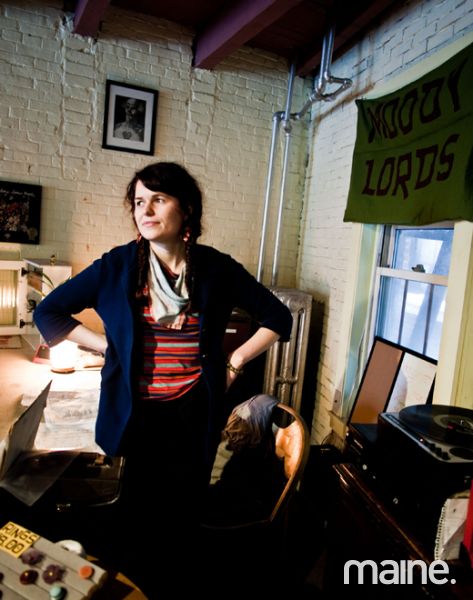
Pump It Up
Further up I-95, in Orono, we stop just before closing time at one of the state’s northernmost outposts for vinyl, Dr. Records. On the university town’s Main Street, the shop is located downstairs in a former Masonic Lodge, and the scene is a familiar riff on Maine record stores—wooden bins to hold the albums upright, band and concert posters on the ceiling, 45 rpm records tacked to the wall. While Elvis Costello pines about “Alison” on the stereo, I can hear footsteps from the burrito and smoothie shop above. In the tidy record bins, I notice that the John Mellencamp records are cross-filed under “C” for Cougar, and this nod to pop history seems both logical and amusing. Owner Don Menninghaus is behind the counter and tells me he’s just sold a batch of Johnny Cash records. His vinyl sales have been going up lately, while CD sales have dropped some. “What’s the draw?” I ask, and the University of Maine grad ticks off the reasons: “nostalgia, the artwork, the perceived fidelity…records have a certain coolness.”
We’re in a groove. (Yes, I said it.) In a quick overnight at the cabin, we set the needle down and play some of our finds. A couple of David Bowies and that 1958 original-cut Billie Holiday rotate on the Wildcat, backdrops for a night of pizza and studying album covers. (I’m always mesmerized…I look and read, flip them over, look again.) The next morning we set out early for the drive from Bangor to Farmington, stopping first at the retro Nicky’s Cruisin’ Diner. While ’50s rock and bop floats through the dining rooms of rock-and-roll memorabilia, our plates of pancakes and sausage arrive—most of the food looking round as records. Filled up and ready, we drive into the western mountains, all the way to Everyday Music in Farmington, a born-in-the-1970s music shop that started with vinyl only. The owner, Ernie Scholl, mentions that he still has about twenty LP display bins in storage at home but has only one in use now at the shop. It’s right by the front window near some twirling batons and a display of kazoos. Guitars hang from the ceiling, and there are racks of sheet music and CDs. He says LPs still draw people in. “Most people enjoy the music that comes out of the grooves of a record.” But not everyone’s a fan. He tells the story of a student with an iPod who took one look at the LPs and said “dinosaurs.” That reminds us of the T. Rex album. A friend in rock-steeped Athens, Georgia, claims the late-’60s British band that played “Get It On” sounds amazing on vinyl. But at every place we’ve asked about the band, the answer is “I haven’t seen one of those in a while,” or worse, “some guy just bought the last copy I had.” We decide to keep asking.
The next stop isn’t a retail store. On eBay I’d come across a seller from Maine. I call, and “Uncle Dick” Holden tells me he’s a former oldies and country station deejay who’s selling off his collection of thousands of 45s and LPs from his home in Gardiner. He agrees to let us come by to see. At a hillside house not far from the A-1 Diner, we get a tour of the collection on three different floors of the house. There’s a display of mostly ’50s-era records on the couch in the living room, and an upstairs workroom for cleaning and sorting where he also displays deerskins and hunting gear (another passion). Then in the basement is the “warehouse,” where Holden has a turntable and headphones for testing, and hundreds of boxes of records already catalogued and ready to sell. He goes into deejay mode and plays a single, Bob Seger’s “You’ll Accompany Me,” and there’s a definite skip. “I’ll see if I can fix that,” he says. “If not, it goes in the trash.” I leave in a partial daze, amazed at the whole set-up… but maybe there are guys with stashes like this all over Maine?
The Final Countdown
Back in the car, we’re still thinking of Mike’s Music. The reputation of the owner, Mike Pollack, is that his passion for music—particularly rock—never fades. Now in his fifties, he doesn’t burn out. We make the drive south of Portland to the store in Sanford to see if we can meet him. “Now, this is a record store,” I hear someone say when we walk in. Actually, I barely hear that. The music is loud, the piled brown carpet worn, and I’m not sure if the place looks more like a teenage boy’s room on overdrive, an acid trip, or a shrine to music. Nearly every square foot in every direction is covered with albums, black-light posters, and rock T-shirts. Hung on one wall is a triple play of portraits of Elvis Presley, Jimi Hendrix, and Jesus—Elvis and Jimi painted on black velvet.
We find Mike himself in the stacks. He’s got ice blue eyes and a “Yellow Submarine” T-shirt, and he’s ready to help us find what we need. “Everything you do is music” is printed on his sign and his business cards. Turns out, he grew up in Detroit and once saw Pink Floyd concert for five dollars. Led Zeppelin? He saw them live in 1971, and Robert Plant was “pretty drunk that night.” The conversation never turns from rock. I ask what he’s playing on the turntable and he says it’s Point Blank, a Texas band from the 1970s. “They smoke. As good as ZZ Top, their first album’s the best, and then the third is as good as the first, but in a different way. You know what I mean?…” He tells me more, but I can’t take it in fast enough. The man is encyclopedic about music. Other customers come in with questions, and he goes looking for the music. One is a twelve-year-old boy in the market for eight-track tapes. Pollack makes the sale and throws in some freebies. Meanwhile, I keep browsing and pick up a blues record from the ’50s, but he says it isn’t for sale, that sometimes his personal stuff gets mixed in. (That is another thing I’d heard, that there’s some stock Mike just won’t sell.) But I know that I’ll find something else in this bunker, the biggest cache we’d seen. Then, and I’m not kidding, I look down to see one of the elusive T. Rex albums, leaning on a pile of records on the floor. A dinosaur found against the odds. We definitely have to take that one back to the record player. I can already picture it. On some dreamy-weather afternoon at the cabin, we’ll bring it back to life.
– By Sandy Lang, published in Maine, the magazine. Photographs by Peter Frank Edwards.
